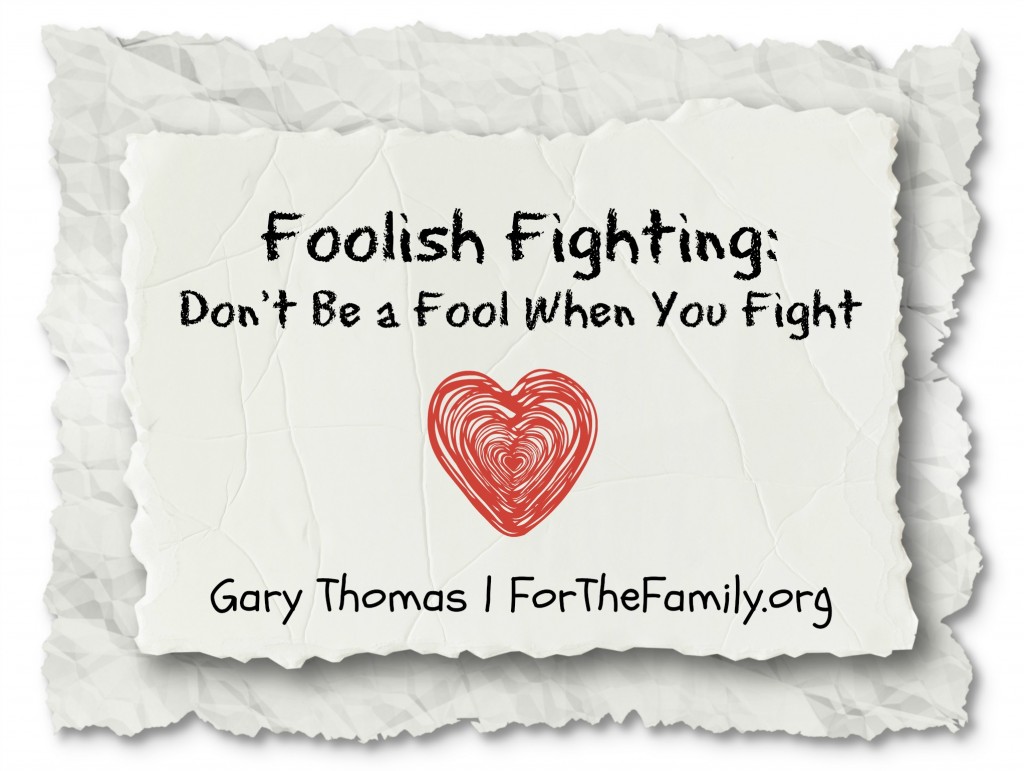Foolish Fighting: Don’t Be a Fool When You Fight
Conflict in marriage is inevitable, but conflict isn’t necessarily a bad thing. Conflict can be productive and fruitful and even help us grow:
- It can bring issues of blindness to the surface: “Really? That’s how you feel when I say that?”
- It can be the great revealer of past hurts: “That’s why you’re so sensitive whenever that topic comes up. Thank you for sharing that.”
- It can help us learn to understand each other.
Viewing “conflict” as all negative is to assume that our relationship and knowledge of each other is completely perfect and that there is no growing to do. No marriage is like that.
There’s one attitude that will determine whether conflict is a cure or a cancer in our relationship, however, and it’s directly related to pride.
Proverbs 18:2 tells us, “A fool does not delight in understanding, but only in revealing his own mind.”
If I don’t want to be a fool, then whenever I am in conflict with my spouse I have to seek understanding more than I seek victory. I have to seek understanding more than I seek to be understood. I have to work twice as hard when I’m listening as I do when I’m speaking. (Seriously, who really does that? But that’s what the Bible calls us to do!) My first goal should be, “How can I understand what my wife is thinking/feeling/believing right now?”
If my goal is to defeat her, confound her or even prove her wrong, I’m acting like a fool.
Notice, it’s not enough to merely want to understand; I should “delight” in understanding her point of view. A “good” fight isn’t one in which I extract an apology or win her over; it’s one in which I come away knowing my wife better than I did before, understanding her motivations, seeing the world through her eyes a little more clearly.
In his commentary on Proverbs, Derek Kidner warns against us ever having a closed mind and an open. That’s a dangerous position for anyone, but especially for a spouse in the midst of conflict.
Bruce Waltke puts several Proverbs together to demonstrate how a fool’s talkativeness proceeds from:
- His cluelessness about how damaging his speech often is (10:8, 10; 14:3; 15:14)
- His being a slave to his emotions, without necessary self-control (12:16; 15:2; 17:27)
- His being wise in his own eyes (26:12).
Of course, if there’s a moral issue involved, it’s entirely appropriate to try to persuade—after you understand. If the two of you disagree over something that matters very much to you—homeschooling versus public schooling, for instance—you should do everything you can to make your point—after you understand where your spouse is coming from.
Let’s be honest: entering a conflict to grow in understanding rather than making our point is one of the most difficult calls of marriage. It’s graduate school Christian spirituality. But if our marriages are normal, we’ll get plenty of opportunities to practice, and the end result really does produce amazing intimacy, understanding, grace, and knowledge of each other.
Conflict can correct misunderstandings, expose blind spots, and make each other feel better known and better understood. That’s a lot of good that can come from a little argument, if it’s handled in a healthy (i.e., biblical) way.
Blessings,
Gary, www.garythomas.com








I am currently in a conflict with my closest friend and as I read this article, I replaced the word “marriage” with “relationship” and it surely spoke to me. Thank you for this timely message.
I love this! Thanks so much for this posting this important reminder.
Gary,Thank you for this. Going through some struggles right now and needed this. Will share with my husband.